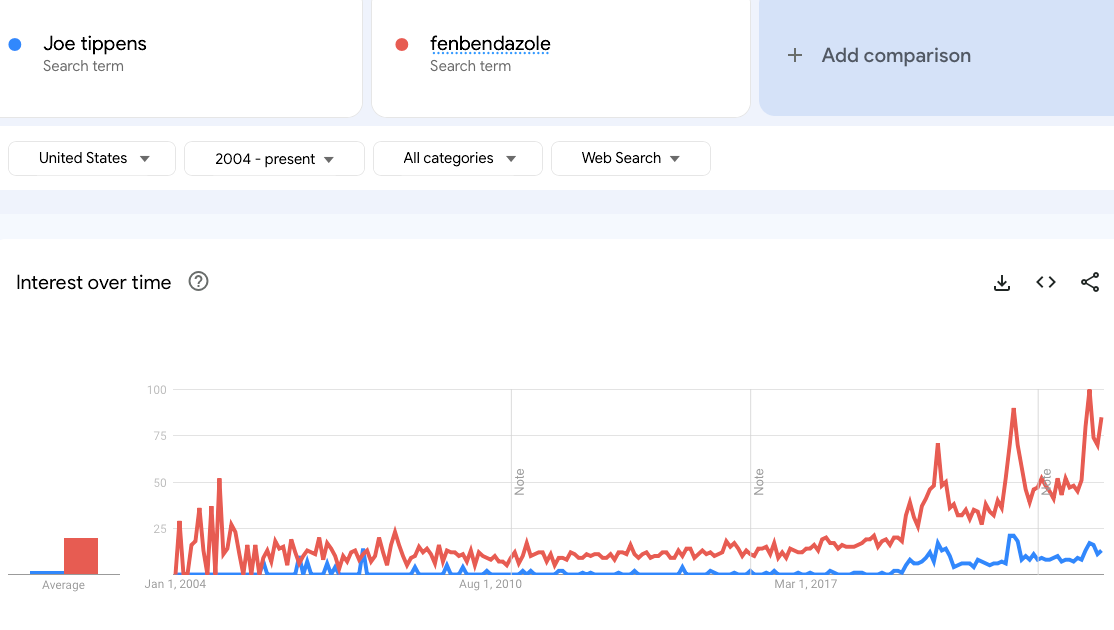Joe Tippens happens to be today’s poster boy for repurposed drugs. After taking Fenbendazole, he mysteriously and abruptly recovered from Stage-4 Small Cell Lung Cancer. His story launched a run on the veterinary medicine, and now there are hundreds of anecdotal reports about people with metastatic cancer suddenly experiencing remarkable and inexplicable remissions. Their stories are astonishingly similar. Patients with late-stage cancer with widespread metastases, often into the brain, bone, and organs, take Fenbendazole, and within weeks or months, a new scan shows complete clearing of the cancer.
For example, take the case of Sharon McDougall, a retired nurse who contracted colon cancer. After moving to California and dealing with her husband’s dementia, she developed abdominal pain, leading to a colonoscopy and, ultimately, a diagnosis of Stage-4 colon cancer [09:55].
After hearing the diagnosis from her local oncologist, she was given the grim news that she would likely not survive more than three to six years. She sought a second opinion, who advised her to focus more on living and not dying.
As a nurse, Sharon knew full well that the standard chemotherapy – FOLFOX – could leave her with nasty permanent complications like neuropathy, and she wanted to avoid that. So when a friend suggested she add herbs to her treatment, she did [13:20]. A few months later, the same friend gave her an article about Joe Tippens and his remarkable cancer recovery using Fenbendazole. “I was down at the Pet Store that day. So I picked up Fenbendazole and got it [14:25].”
She found the human version of the drug, Mebendazole was priced at over 200 dollars per pill; however, she could buy Fenbendazole over the counter – as Safeguard Four - for about $ 16.00.
“So I started taking the Fenbendazole immediately.” This was August. At the time of her follow-up scan in March, she was cancer free [16:50]. “No malignancy found. I was absolutely stunned.”
Nonetheless, her oncologist advised her to remain on chemotherapy. Sharon objected and refused to continue [17:13]. Another friend, a retired nurse, encouraged her to follow the oncologist’s advice, or at the very least, get another opinion.
The second opinion, Dr. Kidder, suggested she try a few months off of chemotherapy, so she did. Another study, a CT, was done and also revealed no evidence of disease. Sharon felt great on the Fenbendazole. She enjoyed exceptional energy levels and was blessed with a new lease on life. Sharon tried out new sports. “I couldn’t believe it. I had so much energy. I was feeling fabulous [19:48].”
Another PET scan performed in June again revealed no evidence of disease. Sharon made some lifestyle changes, including avoiding sugar and drinking alkaline water. “My story is I feel great. Fenbendazole is a miracle. I’m a happy gal and staying on everything I’ve been doing [21:50].”
As a nurse, Sharon brings an educated healthcare professional’s perspective to the decision to use repurposed drugs to treat her cancer. And nurses and physicians rarely use the term “miracle” to describe a treatment result. However, when reviewing cases like Tippens and McDougall, it is the best word that comes to mind, as very few physicians or nurses will ever see even one similar case of late-stage terminal cancer resolving.
Here is a summary for those unfamiliar with Joe Tippens’ story. Joe was preparing to move to Switzerland to accept a lucrative partnership position when a physician discovered a fist-sized tumor in his left lung [02:10]. It was lung cancer.
Three months following his diagnosis of Small Cell Carcinoma of the Lung, it had metastasized or spread throughout his body – “from head to toe.”
“I had tumors in my neck, stomach, bladder, pancreas, and bones from head to toe [03:55]. I don’t know if your listeners know, but when you have small cell cancer that has metastasized that far afield, you’re basically a goner – the life expectancy goes below 1%. The median life expectancy is around three months [04:18].”
Joe Tippens was told to hire hospice and get his affairs in order – essentially to get ready to die. After telling his friends and family the dire news, an old college friend – a large animal veterinarian – suggested he might take Fenbendazole, the veterinary version of Mebendazole. The story of Professor Gregory Riggins’ lab mice who were given Fenbendazole for pinworms only to have it also kill their brain cancers had rocked the research world and spawned intensive study of the drug against human cancers.
As a smart and stunningly successful businessman who had previously sold a corporation to Microsoft Co-founder Paul Allen, Joe conducted a risk versus benefit analysis.
He found that the downside could not be worse than death from cancer. He realized that the upside could be his long-term survival. So Joe felt he had nothing to lose by trying Fenbendazole. After hearing the mice story and beginning FBZ along with a few other supplements, like Vitamin E, Curcumin, and CBD oil, he, like Sharon, began to feel alive again. He returned to work. And the months ticked by without his death. He asked for a new scan, and remarkably where the tumors were before, they were no more. The cancer that had been present just a few months prior from head to toe was gone.
As Tippens explains it, “I went through a period of unknown. I went all the way through January, February, March and April of 2017 waiting to die because the median life expectancy was three months, but I felt fine - there were no symptoms, I felt great, I was working again, and I went in for a scan the first week of May of 2017 – 3 ½ months later and I was all clear [08:41]. A previous PET scan that lit up like a Christmas Tree from my neck to my pelvis in my bones and all my internal organs was now gone – completely.”
Joe suffered from the deadliest form of lung cancer, Small Cell Cancer, nicknamed Oat Cell Cancer. Even the medical literature on PubMed, the National Library of Medicine describes is as “not curable.”
For example, Dr. Neil Basumallik wrote, “Close to 70% of patients with small cell lung cancer have disseminated disease at the time of presentation. At this stage, the cancer is not curable, and the prognosis is poor. Even with chemotherapy, the majority of patients are dead within 24 months, and less than 2% are alive at five years.”
There are always naysayers and critics, especially among Big Pharma which stands to lose a lot if Joe Tippens’ story gains traction, and it has.
If Google Trends is any indicator, interest in Joe Tippens and Fenbendazole has steadily grown since his story broke around six years ago.
The price of Fenbendazole has jumped, although it is still cheap compared to the human version that is now hundreds of dollars per pill. And Tippens who happens to have been a millionaire venture capitalist before his cancer diagnosis, became an unlikely celebrity.
He explains that his phone began ringing off the hook after his story broke. So, to save time, he wrote a viral blog that brought him even more attention. Others copied his treatment which involved Fenbendazole, Curcumin, Vitamin E, and CBD oil. Within a couple of years, the “Tippens Protocol” spread worldwide with millions of hits and tens of thousands of users.
Tippens monitors his blog and keeps a record of success stories, those people like him who were told to hire hospice and get their affairs in order, to that group of people modern medicine had thrown away and told to prepare to die because there was nothing more possible that could be done. That group of people who tried one last treatment – the Tippens Protocol. And miraculously, they recovered completely. Joe reports that number of cancer recoveries is up to around 300.
However, Big Pharma is attempting major damage control by suggesting that Joe Tippen’s remarkable recovery had more to do with a clinical trial he was involved in, than with Fenbendazole.
Keep reading with a 7-day free trial
Subscribe to Repurposed Drugs: Powers & Possibilities to keep reading this post and get 7 days of free access to the full post archives.





